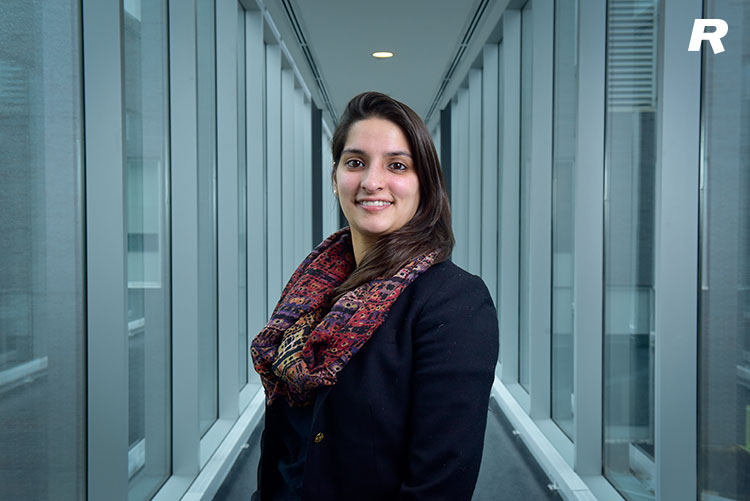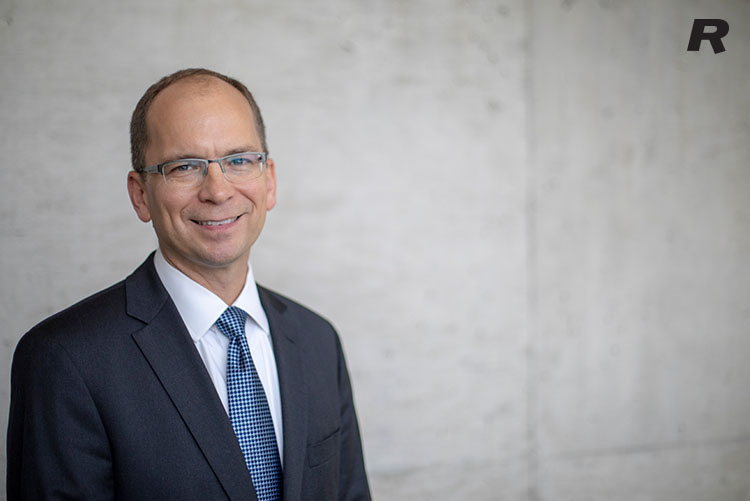Management researchers don’t shy away from the big issues.
Whether they’re developing a coordinated strategy for managing the next global health crisis or proposing policies that support economic growth as well as gender and racial equality, management researchers seek to better understand — and solve — the most pressing challenges confronting business and society.
In some ways, leading a comprehensive research project can be just as challenging as the issues being studied. Researchers need colleagues who will challenge their ideas and make them stronger, collaborators with complementary areas of expertise and resources to execute their ideas — all of which can be found at the Rotman School of Management.
Real-world impact
There are several reasons why early-stage researchers are drawn to the Rotman School.
Many are impressed by the School’s reputation, as PhD students and junior faculty can expect to collaborate with or be mentored by Bank of Canada Fellows and Canada Research Chairs. Rotman senior faculty members have won the Killam Prize or been named a fellow of the Royal Society of Canada, among other honours.
Most incoming junior faculty appreciate the fact that they are joining a business school known for its productivity. After all, the Rotman School has consistently placed among the top twenty business schools in the world for faculty research published in leading academic and practitioner journals, according to the Financial Times’ ranking of MBA programs. Recent events have not slowed progress: since the onset of the global pandemic, Rotman researchers have published two new books and more than 50 COVID-related articles and editorials examining the economic and social impacts of the global pandemic on sectors, cities and trade.
As well, the School is known for its robust resources. In addition to providing generous start-up funds for new faculty, the School sets aside financing each year for travel awards, small data grants and to support faculty with hosting conferences and research roundtables. The School is outfitted with various labs — including the School’s Behavioural Research Laboratory, the TD Management Data and Analytics Lab and the BMO Financial Group Finance Research and Trading Lab — to support them with their research.
What draws young researchers to the School is the opportunity to make an impact on a grander scale.
“It’s refreshing to do research at a school like Rotman, where field research is highly valued and has a definite impact,” explains Avni Shah, an assistant professor in the Marketing area at the University of Toronto Scarborough, with a cross-appointment to the Rotman School.

Avni Shah
Assistant Professor of Marketing, Department of Management, University of Toronto Scarborough
Shah was motivated to launch her academic career at Rotman because of the opportunities to work directly with governments and policy makers to test theories in relevant settings.
Rotman professors have been known to advise governments on trade and economic policies, instruct companies on how they can improve inclusion and representation in their practices, and even author bestselling books that have changed the way companies do business and plan. (A few notable recent examples include Professor Sarah Kaplan’s The 360° Corporation, Professor András Tilcsik’s Meltdown and Professors Ajay Agrawal, Joshua Gans and Avi Goldfarb’s Prediction Machines.)
Shah, who is a research fellow with the Behavioural Economics in Action at Rotman (BEAR) group, explores interventions for encouraging saving behaviours and improving financial well-being. Though many of her papers investigating strategies for increasing saving behaviours among individuals in Mexico are still under review or in the revision stage — and months away from publication — she knows she’s already helped many people in Mexico save for retirement.
“In academia, it’s typical to wait years for research to be completed and be published in top-tier, peer-reviewed journals,” she says. “At Rotman, collaborations with government organizations and practitioners allow you to see the immediate impact of your work, which can be motivating.”
A place for developing solutions
A major reason why Rotman faculty, at all levels, can make a huge impact is because of the calibre of the corporate and community partners that the School attracts.
“More and more, corporate leaders and changemakers are coming to Rotman to work on the tough problems that matter most to them,” explains Kenneth S. Corts, Vice-Dean, Research, Strategy, and Resources. “Rotman has a reputation for being a place where you can find answers and develop solutions.”

Kenneth S. Corts
Vice-Dean, Research, Strategy, and Resources.
For instance, when financial experts at TD Bank wanted to further their work in big data and in training future practitioners to understand its potential, they came to Rotman to launch the TD Management Data and Analytics Lab. And when philanthropist Michael Lee-Chin was looking to advance progress in sustainable business, he partnered with Rotman to launch the Michael Lee-Chin Family Institute for Corporate Citizenship.
Many other corporations — including Bain & Co, BMO, CIBC, CPA Ontario, CPP Investments, Deloitte, Mackenzie Investments, PwC — have partnered with and supported Rotman research initiatives around equity, fintech, behavioural economics and sustainable business, among other topics.
In addition to all this, during the 2017-2020 period alone, Rotman faculty secured $1.8 million in tri-council grants (from the Canadian Institutes of Health Research, the Natural Sciences and Engineering Research Council of Canada and the Social Sciences and Humanities Research Council) and over $500,000 in external funding (from governments, not-for-profits and private donors) for their research.
“It’s important for junior faculty to note that Rotman has impressive visibility among the corporate and political world, and your research here will attract attention,” says Corts. “Often, that attention leads to other exciting opportunities and partnerships.”
Shah agrees and says she’s impressed by the number of new opportunities constantly coming up at the School.
“I think most junior faculty fear not securing funding and being limited in the work they can accomplish,” explains Shah.
“At many business schools, junior faculty rely on a start-up fund and patiently work on one project at a time. It’s refreshing at Rotman, where researchers are constantly being presented with new funding opportunities, and we are encouraged to get distracted and pursue diverse and new research interests.”
Unique collaborations
The range of research centres based at the Rotman School is another key selling point for junior faculty. The centres drive progress in various areas of business and management (including behavioural economics, capital markets, financial innovation, gender and the economy, health sector strategy, real estate and sustainable finance) and can inspire interesting multi-disciplinary research collaborations.
“In a big university, it can be challenging to find researchers with similar interests, but research centres have a natural way of bringing together academics from management research, sociology, anthropology, political science, engineering and so many other disciplines,” says Shah, who in addition to her work with BEAR, won a grant from another research centre, the Institute for Gender and the Economy.
“Those roundtables and workshops can spark some very interesting conversations and exciting project ideas.”
Additionally, the Rotman research community is strengthened by the many cross-appointments that faculty hold at U of T’s other campuses in Mississauga and Scarborough. This creates a large and vibrant research community, with many opportunities for collaboration.
For instance, Nayana Reiter, an assistant professor in the Accounting area at Rotman, recently embarked on a truly tri-campus research collaboration with Andrea Down, an assistant professor with the Department of Management at U of T Scarborough and Aida Wahid, an associate professor of Accounting at the Department of Management at U of T Mississauga. (All three collaborators are appointed or cross-appointmed to the Rotman School.) Their study, which received funding from the Connaught Fund and CPA Ontario, will examine how firm managers communicated with investors during the global pandemic.
Outstanding community
It was the collegiality that initially drew Reiter to the Rotman School. She was struck by the enriching discussion during her Rotman job talk, where final-year PhD students deliver presentations at the various academic institutions they hope to work for after graduation.
“I recall seeing a nice mix of thoughtful questions and collegiality,” says Reiter, who at the time was completing her graduate studies at the University of Michigan. “I instantly knew this was a group that’s focused on asking you difficult questions and pushing you to deliver your best work.”
This outspoken faculty has proved especially useful when preparing for speaking engagements and academic presentations. Once, Reiter called on her colleagues to ask her the tough questions in preparation for an upcoming presentation at London Business School (“I think I fielded the toughest questions from my Rotman colleagues rather than at the actual talk,” she notes.)
Outside of research and work, there’s a feeling of community and outstanding mentorship among faculty that sets Rotman apart. In many academic areas, faculty and PhD students meet regularly to socialize and, inevitably, to discuss their research. The School has a long-standing tradition of meeting on Friday evenings, and Rotman faculty from all three campuses and across all academic areas are invited.
“Every week it’s an interesting and different group of people introduce yourself to,” says Shah. “It makes first-year faculty members feel instantly included and part of the community there.”
Ultimately, all these efforts reflect one of the Rotman School’s top priorities: for its faculty to succeed and build strong careers.
“We want to instill this idea among junior faculty members that their success is the School’s success,” says Corts. “We’re invested in them. We believe that they’re capable of taking on and solving the major issues in business and society right now.”